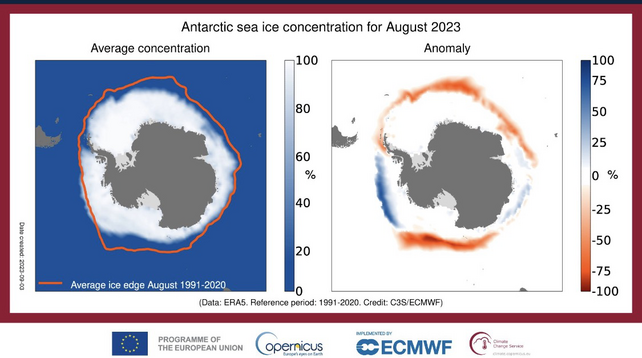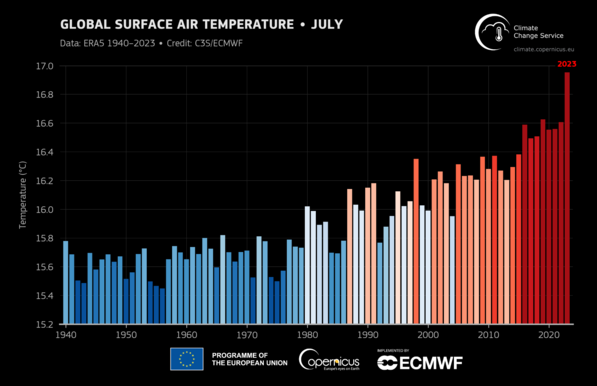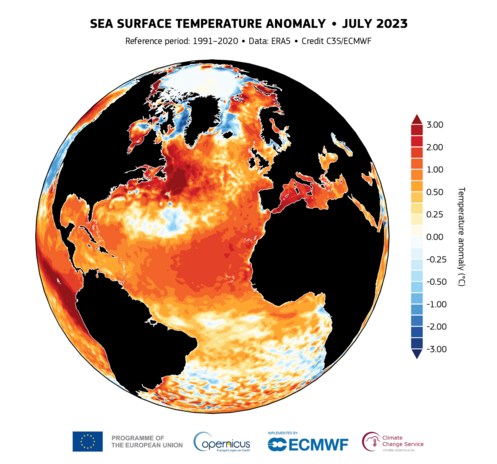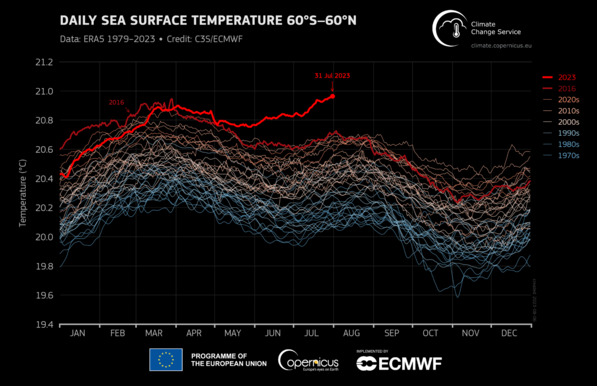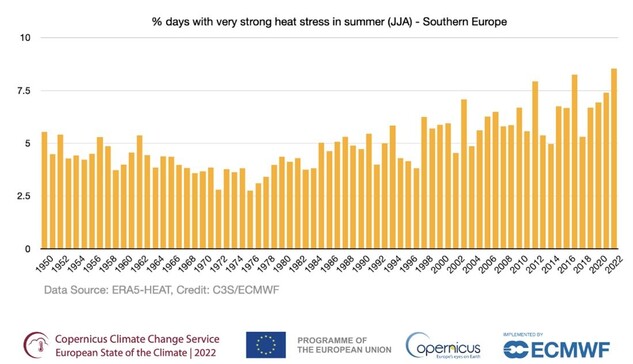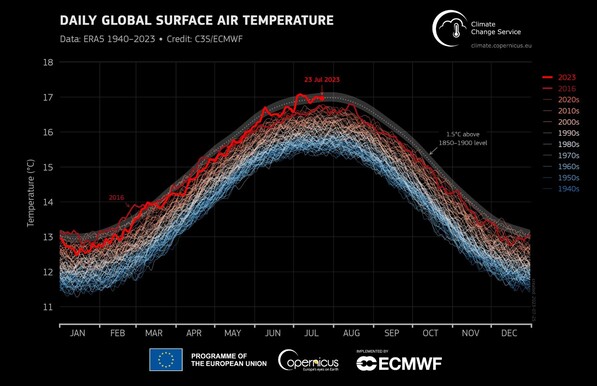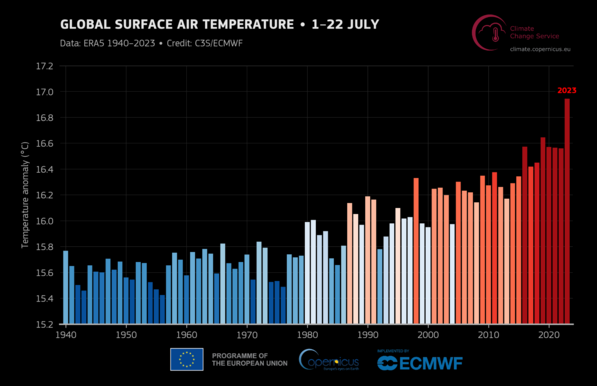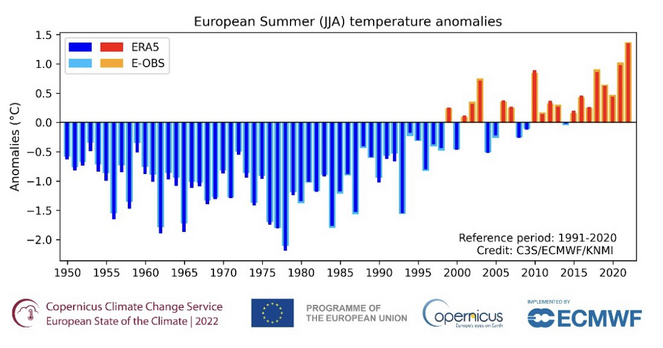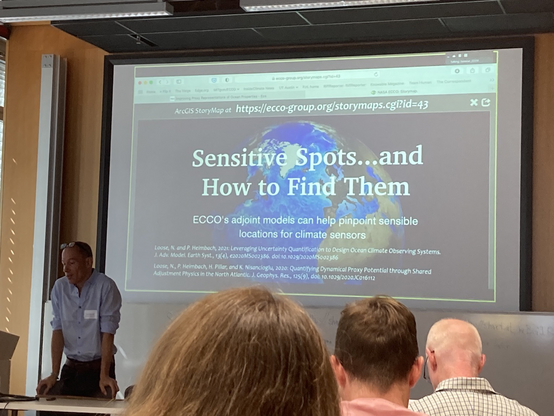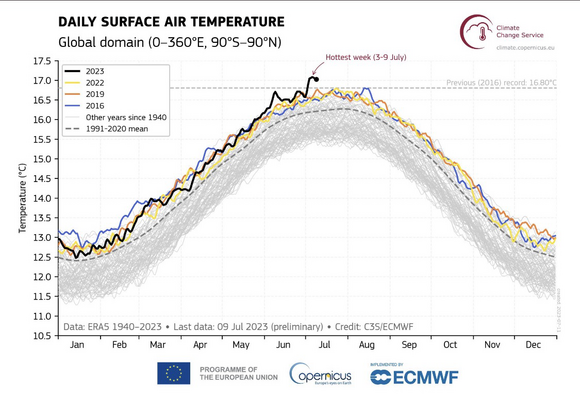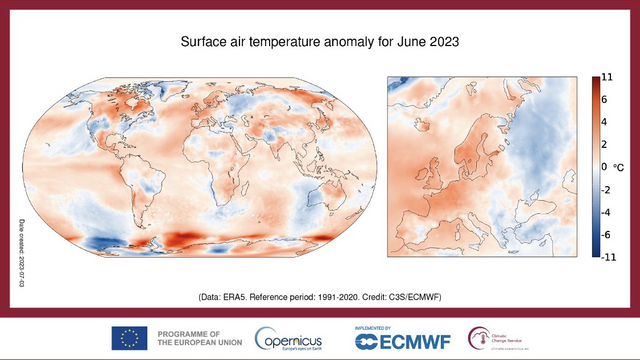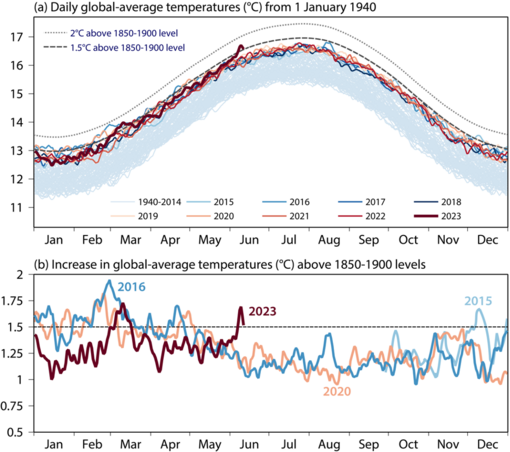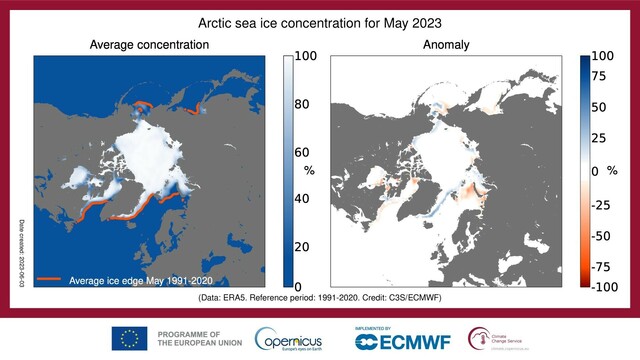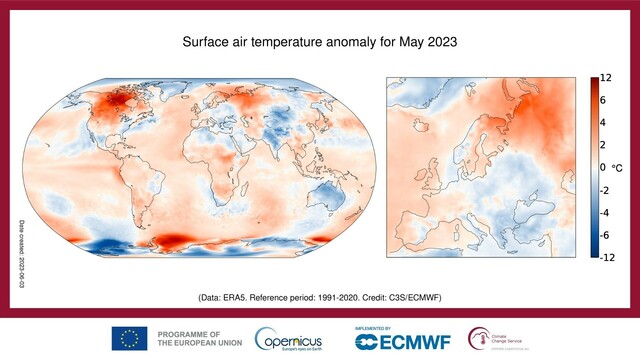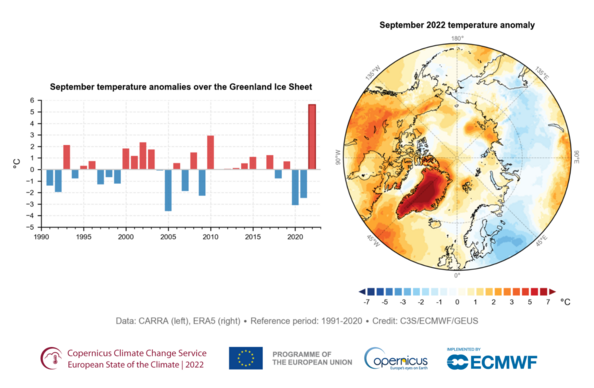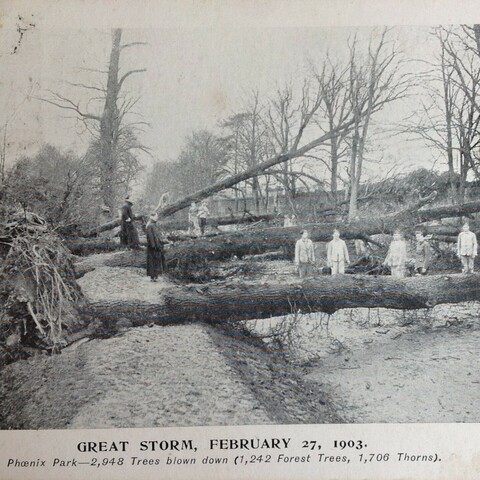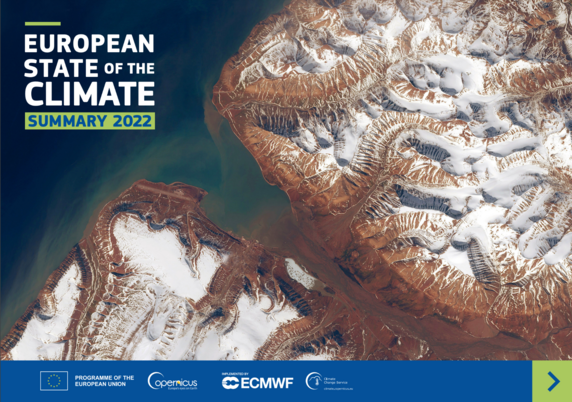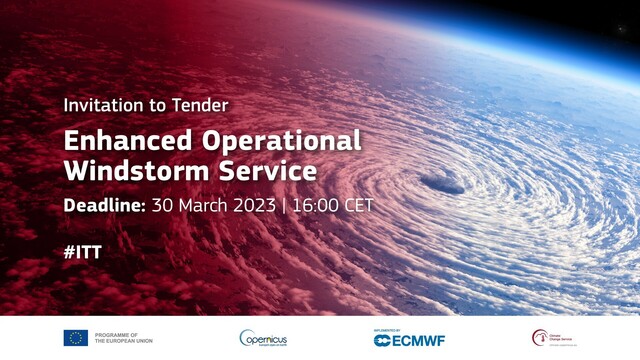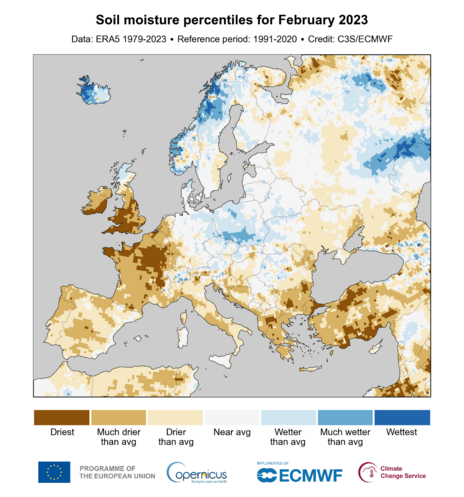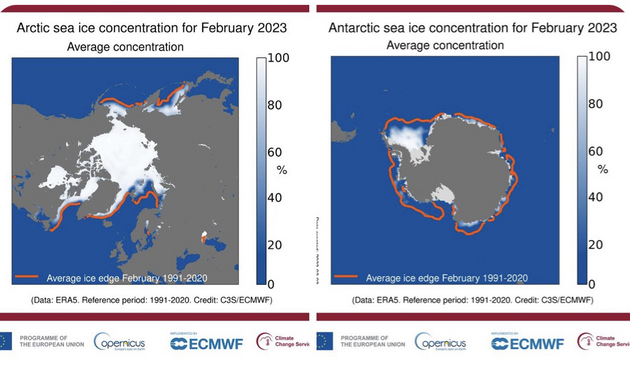Dr Sam Burgess 🌊 🌍 💸 · @OceanTerra
964 followers · 279 posts · Server fediscience.orgAugust #SeaIce highlights from #C3S:
❄️ #Antarctic sea ice saw the largest negative anomaly for August on record, at 12% below average;
❄️ #Arctic sea ice was 10% below average but well above the record minimum from August 2012.
#CopernicusClimate #Climate #seaice #Reanalysis #climatecrisis #Antarctic
#climatecrisis #Reanalysis #Climate #CopernicusClimate #arctic #Antarctic #C3S #seaice
Dr Sam Burgess 🌊 🌍 💸 · @OceanTerra
934 followers · 268 posts · Server fediscience.orgJuly 2023: Global air and ocean temperatures reach new record highs @CopernicusECMWF
More: https://climate.copernicus.eu/july-2023-global-air-and-ocean-temperatures-reach-new-record-highs
#Climate #ClimateCrisis #CopernicusClimate #OpenData #heatwave #EMCWF #Reanalysis
#Reanalysis #emcwf #heatwave #opendata #CopernicusClimate #climatecrisis #Climate
Dr Sam Burgess 🌊 🌍 💸 · @OceanTerra
934 followers · 266 posts · Server fediscience.org"These records have dire consequences for both people & the planet exposed to ever more frequent & intense extreme events”
#ClimateCrisis #ocean #ClimateAction #reanalysis #CopernicusClimate #OpenData #OpenSource #heatwave
#heatwave #opensource #opendata #CopernicusClimate #Reanalysis #climateaction #ocean #climatecrisis
Dr Sam Burgess 🌊 🌍 💸 · @OceanTerra
930 followers · 265 posts · Server fediscience.orgOur latest analysis on global (extrapolar) surface ocean temperature records in July 2023 @CopernicusECMWF
More: https://climate.copernicus.eu/global-sea-surface-temperature-reaches-record-high
#ClimateCrisis #ClimateAction #Reanalysis #CopernicusClimate #OpenData #Ocean #heatwave
#heatwave #ocean #opendata #CopernicusClimate #Reanalysis #climateaction #climatecrisis
Dr Sam Burgess 🌊 🌍 💸 · @OceanTerra
920 followers · 258 posts · Server fediscience.orgAs we have more heat waves we also suffer from more heat stress.
Heat stress is more than temperature and is a metric that describes how the environment impacts people (temperature, humidity, wind, soil etc.)
Last summer Europeans saw more heat stress than ever before.
Learn more here:
https://climate.copernicus.eu/esotc/2022/extreme-heat
#CopernicusClimate #ClimateCrisis #ClimateAction #Reanalysis #OpenData #ECMWF #extremes #heatwave #heatstress
#HeatStress #heatwave #extremes #ecmwf #opendata #Reanalysis #climateaction #climatecrisis #CopernicusClimate
Dr Sam Burgess 🌊 🌍 💸 · @OceanTerra
914 followers · 252 posts · Server fediscience.org*New Opportunity*
Interested in working at the cutting edge of #climate data with the #CopernicusClimate team?
Come work with us at @CopernicusECMWF and ECMWF in the reanalysis team building the next generation - ERA6
More: https://jobs.ecmwf.int/Job/JobDetail?JobId=73
#job #jobopportunity #new #opensource #OpenScience #ClimateCrisis #Reanalysis #EarthObservation #EOchat @LadiesOfLandsat
#EOChat #earthobservation #Reanalysis #climatecrisis #OpenScience #opensource #new #jobopportunity #job #CopernicusClimate #Climate
Dr Sam Burgess 🌊 🌍 💸 · @OceanTerra
890 followers · 242 posts · Server fediscience.orgData from the @copernicusecmwf the first 3 weeks of July have already broken several significant records, including:
Hottest day globally;
Hottest 3 weeks globally.
C3S data also show:
July 2023 likely to be hottest month on record.
More here: https://climate.copernicus.eu/july-2023-sees-multiple-global-temperature-records-broken
#ClimateCrisis #ClimateAction #OpenData #ERA5 #ECMWF #reanalysis #CopernicusClimate
#CopernicusClimate #Reanalysis #ecmwf #ERA5 #opendata #climateaction #climatecrisis
Dr Sam Burgess 🌊 🌍 💸 · @OceanTerra
887 followers · 241 posts · Server fediscience.org🌡️📈 Europe has been experiencing some of the hottest temperatures of summer 2023 so far.
But what is influencing this #heatwave, what are its potential consequences, & is #ClimateChange affecting it?
Find out in our new article 👉
#climatecrisis #Climate #opendata #CopernicusClimate #ERA5 #heatwave #Reanalysis
#Reanalysis #ERA5 #CopernicusClimate #opendata #Climate #climatecrisis #climatechange #heatwave
Femke de Jong 🌊 · @Fmkdejong
402 followers · 556 posts · Server fediscience.orgPatrick Heimbach on used adjoint approaches to find pathways of connectivity and assess data redundancy #oceanography #Reanalysis
Dr Sam Burgess 🌊 🌍 💸 · @OceanTerra
887 followers · 241 posts · Server fediscience.org📈According to #ERA5 the 7 days from 3rd to 9th July 2023 were the 7 hottest days on record globally, making the first week of July 2023 the hottest week on record.
Download the #opensource dataset here:
https://cds.climate.copernicus.eu/cdsapp#!/dataset/reanalysis-era5-single-levels?tab=overview
#CopernicusClimate #ECMWF #ClimateCrisis #OpenScience #reanalysis
#Reanalysis #OpenScience #climatecrisis #ecmwf #CopernicusClimate #opensource #ERA5
Dr Sam Burgess 🌊 🌍 💸 · @OceanTerra
887 followers · 241 posts · Server fediscience.orgThe #C3S monthly Climate Bulletin is out now:
📈June was the warmest June globally at just over 0.5°C above average;
📈 the North Atlantic saw record-high sea surface temperatures;
📈#Antarctic sea ice reached its lowest extent for June on record at 17% below average.
#CopernicusClimate #reanalysis #climate #climatecrisis #ERA5
#ERA5 #climatecrisis #Climate #Reanalysis #CopernicusClimate #Antarctic #C3S
Dr Sam Burgess 🌊 🌍 💸 · @OceanTerra
828 followers · 225 posts · Server fediscience.orgGlobal mean temperature exceeded 1.5 degrees threshold during the first days of June according to @CopernicusECMWF data.
Monitoring how often and for how long these breaches occur is more important than ever, if we are to avoid more severe consequences of the climate crisis.
More: https://climate.copernicus.eu/copernicus-first-days-june-surpass-150c-limit
#CopernicusClimate #ClimateCrisis #Climate #ClimateAction #Reanalysis #ECMWF #opensource
#opensource #ecmwf #Reanalysis #climateaction #Climate #climatecrisis #CopernicusClimate
Dr Sam Burgess 🌊 🌍 💸 · @OceanTerra
822 followers · 224 posts · Server fediscience.orgMay SeaIce highlights from #C3S:
#Antarctic sea ice extent reached a record low monthly value at 17% below average;
#Arctic sea ice extent was very close to average and almost identical to the value recorded in May 2022.
#CopernicusClimate #ECMWF #reanalysis #OpenScience #EarthObservation #ERA5 #ClimateCrisis #ClimateAction #Arctic #Antarctic
#climateaction #climatecrisis #ERA5 #earthobservation #OpenScience #Reanalysis #ecmwf #CopernicusClimate #arctic #Antarctic #C3S
Dr Sam Burgess 🌊 🌍 💸 · @OceanTerra
822 followers · 223 posts · Server fediscience.org2nd warmest May - following
4th warmest April and
2nd warmest March
Globally since 1950.
The #C3S monthly Climate Bulletin is out now:
📈 #Antarctic sea ice extent reached a record low monthly value at 17% below average;
📈 Conditions were drier-than-average in the Iberian Peninsula.
#CopernicusClimate #Reanalysis #EarthObservation #Climate #ClimateData #OpenScience
#OpenScience #climatedata #Climate #earthobservation #Reanalysis #CopernicusClimate #Antarctic #C3S
Dr Sam Burgess 🌊 🌍 💸 · @OceanTerra
781 followers · 209 posts · Server fediscience.orgIn September 2022, Greenland saw record-breaking temperatures for the month and rain rather than snow, resulting in record ice sheet melt.
Read more from the #CopernicusClimate report here:
https://climate.copernicus.eu/esotc/2022
Lots of cool animations of the atmospheric rivers from CARRA data via @jasonbox
#Arctic #Reanalysis #EarthObservation #opensource #OpenScience #ClimateCrisis #Greenland
#Greenland #climatecrisis #OpenScience #opensource #earthobservation #Reanalysis #arctic #CopernicusClimate
Dr Sam Burgess 🌊 🌍 💸 · @OceanTerra
781 followers · 208 posts · Server fediscience.orgStorm Ulysses paper out now - @ed_hawkins and many co-authors including me.
Rescuing old data helps improve our understanding of current and future wind risks
and paper here:
https://nhess.copernicus.org/articles/23/1465/2023/
#ClimateAction #DataRescue #CitizenScience #Reanalysis #ClimateStripes
#climatestripes #Reanalysis #citizenscience #Datarescue #climateaction
Dr Sam Burgess 🌊 🌍 💸 · @OceanTerra
772 followers · 205 posts · Server fediscience.orgUnprecedented extreme heat and widespread drought impacted European climate in 2022
Latest report by our @CopernicusECMWF team
is out now:
https://climate.copernicus.eu/esotc/2022
#CopernicusClimate #ClimateAction #Reanalysis #OpenScience #OpenData #ClimateChange #EarthObservation
#earthobservation #climatechange #opendata #OpenScience #Reanalysis #climateaction #CopernicusClimate
Dr Sam Burgess 🌊 🌍 💸 · @OceanTerra
768 followers · 202 posts · Server fediscience.orgAre you an expert in #Climate or #Energy data? Or know someone who is? If so please apply to help us update #windstorm indicators for Europe, including timely, high-quality products and information on wind #extremes
More info here:
https://climate.copernicus.eu/c3s2413-enhanced-operational-windstorm-service
#earthobservation #Reanalysis #CopernicusClimate #extremes #windstorm #energy #Climate
Dr Sam Burgess 🌊 🌍 💸 · @OceanTerra
765 followers · 195 posts · Server fediscience.orgIn February 2023, most of western #Europe experienced below-average soil moisture, reaching more than 4% below average in many regions, and more than 8% below average in parts of Spain and Türkiye. Although not as low in magnitude as for Spain and Türkiye, the soil moisture levels in parts of Ireland, UK and France, were lower than any previous February in the #ERA5 soil moisture record from 1979.
#CopernicusClimate #reanalysis #Climate #OpenScience #hydrology
#hydrology #OpenScience #Climate #Reanalysis #CopernicusClimate #ERA5 #europe
Dr Sam Burgess 🌊 🌍 💸 · @OceanTerra
761 followers · 189 posts · Server fediscience.orgRecord sea ice lows at both poles. Lowest Antarctic sea ice ever recorded by satellites.
February #SeaIce highlights from #CopernicusClimate
❄️ #Antarctic sea ice reached its lowest value on record, at 34% below average
❄️ #Arctic sea ice extent was 4% below average, the 2nd lowest on record
For more: https://climate.copernicus.eu/sea-ice-cover-february-2023
#OpenScience #opendata #Reanalysis #climatecrisis #Climate #arctic #Antarctic #CopernicusClimate #seaice
